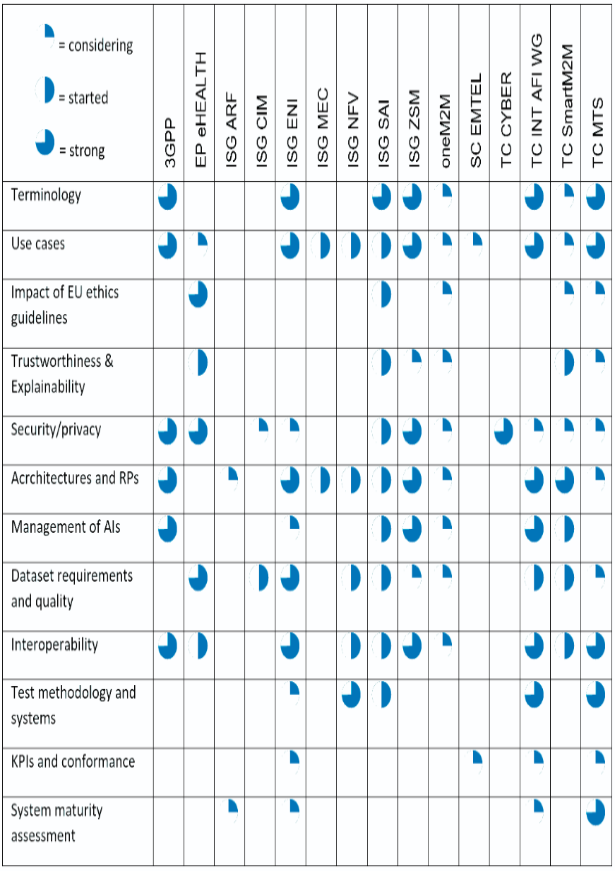ETSI Involvement in AI
Artificial Intelligence is accelerating the digital transformation and ETSI is at the heart of digital. Design and implementation of AI is developing rapidly in many sectors of the market. ETSI develops globally recognized ICT standards with direct impacts on Industry, SMEs, Academia, Citizens, and Public Institutions.
The ETSI community has a strong interest in AI as a “tool”: in architectural models, to enhance Information/data models, to redesign operational processes, to increase solution interoperability, and for data management for new ICT standards.
ETSI specifications as well as workshops, webinars, guides and White Paper#34 Artificial Intelligence and future directions for ETSI and White Paper#52 ETSI Activities in the field of Artificial Intelligence Preparing the implementation of the European AI Act of the European AI Act can offer practical support to the introduction of AI into many areas.
The use of AI in ICT is considered to be a game changer, because it enables new business cases that take ICT beyond pure connectivity, supporting new services with added value and efficient operation.
Where are AI topics covered inside ETSI ?
The group OCG AI acts as a coordination group for the standardisation activities related to AI that are handled in the technical bodies, committees and ISGs of ETSI, mainly as listed below.

OCG AI Way of Working
|
The OCG AI was launched in June 2020. OCG AI Meetings are held 4 to 8 times per year, and ETSI members can see the schedule of meetings and past contributions here. Membership of OCG AI is primarily for chairs or specially nominated technical experts from ETSI ISGs, TCs, as well as ETSI Board members. Guests may be invited to specific meetings, also from external organisations.
It is not part of the OCG AI responsibilities listed in the OCG AI Terms of Reference to produce standards or promote specific AI solutions, but rather to:
- facilitate the exchange of views and information on AI activities in TBs and ISGs in order to identify synergies, best practices and common requirements
- evaluate the impact of AI on the production of standards (e.g. interoperability, testing, compliance to EU ethical guidelines) that can be common to different TB/ISGs and suggest guidelines for the relevant TB/ISGs
- identify common activities (e.g. terminology, common requirements) or standardization-related gaps, and make proposals on how to address them
- promote and maintain a coordinated view of information (including work items) from TBs/ISGs on activities related to AI
- coordinate provision of information by the TBs and ISGs on AI matters relevant to ETSI
- be a continuously-available interface between ETSI and EC/EFTA for response to questions and calls for comment on issues relevant to AI standardization
- report to the OCG, the Board, the GA, or the EC whenever required
- consider the need for and/or propose external cooperation related to AI standardization.
|
Where are AI topics covered outside ETSI ?
| EC
|
https://ec.europa.eu/digital-single-market/en/artificial-intelligence
|
Whitepapers and policy with impact on AI standardisation
|
|
CAHAI
|
https://www.coe.int/en/web/artificial-intelligence/cahai
|
The Committee will examine the feasibility and potential elements on the basis of broad multi-stakeholder consultations, of a legal framework for the development, design and application of artificial intelligence, based on Council of Europe’s standards on human rights, democracy and the rule of law.
|
|
CEN/CLC FG on AI
|
https://www.cencenelec.eu/news/brief_news/Pages/TN-2019-018.aspx
|
CEN-CENELEC Focus Group on Artificial Intelligence (AI) was establishedin December 2018 by the CEN and CENELEC Technical Boards (BT). It will soon be superceded by a CEN/CLC JTC 21 on AI where ETSI is exptected to be a guest
|
|
IEEE A-IS
|
https://standards.ieee.org/industry-connections/ec/autonomous-systems.html
|
The IEEE Autonomous System group's mission is, “To ensure every stakeholder involved in the design and development of autonomous and intelligent systems is educated, trained, and empowered to prioritize ethical considerations so that these technologies are advanced for the benefit of humanity.”
|
|
IEEE ECPAIS
|
https://standards.ieee.org/industry-connections/ecpais.html
|
The goal of The Ethics Certification Program for Autonomous and Intelligent Systems (ECPAIS) is tocreate specifications for certification and marking processes that advance transparency, accountability and reduction in algorithmic bias in Autonomous and Intelligent Systems (A/IS).
|
|
ISO/IEC JTC 1/SC 42
|
https://www.iso.org/committee/6794475.html
|
ISO/IEC JTC 1 SC 42 - Artificial Intelligence and big data - serves as the focus and proponent for JTC 1's standardization program on Artificial Intelligence and provides guidance to JTC 1, IEC, and ISO committees developing Artificial Intelligence applications.
|
|
ITU-T FG AI4H
|
https://www.itu.int/go/fgai4h
|
The ITU/WHO Focus Group on artificial intelligence for health (FG-AI4H) works in partnership with the World Health Organization (WHO) to establish a standardized assessment framework for the evaluation of AI-based methods for health, diagnosis, triage or treatment decisions. Participation in the FG-AI4H is free of charge and open to all.
|
|
ITU-T FG-AI4AD
|
https://www.itu.int/en/ITU-T/focusgroups/ai4ad/Pages/default.aspx
|
The FG-AI4AD supports standardization activities for services and applications enabled by AI systems in autonomous and assisted driving.
|
|
ITU-T SG13 FG ML5G
|
https://www.itu.int/en/ITU-T/focusgroups/ml5g/Pages/default.aspx
|
ITU-T SG13 FG ML5G - Focus Group on Machine Learning for Future Networks including 5G
|